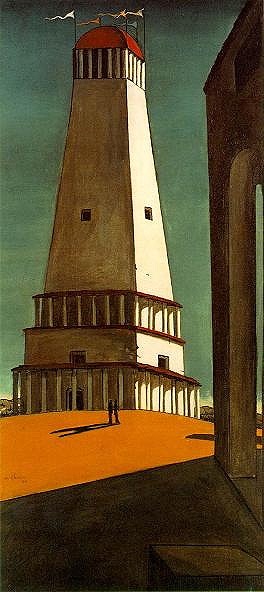Homering

Giorgio de Chirico: The Nostalgia of the Infinite (1911)
"I might, finally, at last, accept that my future's fully back in my hands now."
As I noted yesterday, I caught myself feeling lost in the perhaps necessarily disorienting transition between then and WhatNext. I must have expected my world to crisply snap back into some poorly-remembered before state after The GrandOtter departed for her next adventure, but except for the suddenly empty guest bedroom and bath, the place remained disappointingly the same, essentially unchanged save for a notable absence of a persistent background hum. Every displaced routine remained disrupted and seemed reluctant to snap back into what I imagined to be its former place. Worse, I felt a deep reluctance to simply pick up the former pace, to fill the suddenly empty spaces with fresh ambition and activity. I sheltered more or less in place, staring at a too familiar face. Home would refuse to meet me halfway. I'd have to engage in some dedicated Homering. ©2020 by David A. Schmaltz - all rights reserved
Homering refers to a complicated process by which an imagined outcome becomes an actual one leached of nostalgia and Utopian expectations. I consider Homering to be one of the essential abilities for anyone hoping to recover a sense of place in any space disrupted by prior events. A failure to properly engage in Homering might explain how hauntings come into being, for ghosts thrive wherever Homering's failed. The expectation that a mere absence might transform a place into one of its better angels labors against recovery, which must by necessity come painstakingly. Nothing simply snaps back into place. A general reordering of both expectations and the contents of a place seems at least necessary if not essential. A period, extended or brief, of denial typically separates any departing past and any emerging future, but denial only carries anyone so far, by which I mean, not terribly far at all.
Sleeves will need rolling up, and sweat, genuine sweat, must replace the passive sense that life might automatically regain its formerly accustomed pace. It simply cannot snap back, since it was never just suspended and placed on an out of the way shelf for easy future redeployment. It left and found alternate arrangements, very likely never to return. However emphatically nostalgia might burn then, whatever it pines after will not be returning. It's well and truly gone, and Homering comes to accept this disquieting fact. There will be no going back. The lame delusion that you somehow possessed that time and place needs displacing with perhaps a begrudging acceptance, some serious reframing probably required. The way it was before expired and will never be returning home again. Home will even seem distant for a spell, at least until some metaphysical homesteading can occur in the form of Homering.
Who will I be this time? What role might The Muse fulfill? Neither of us will know until we complete the necessary chores. Those long-deferred cleanings. The dreaded reordering. The dislocations and the relocations necessary to unpack a place never deliberately packed away. I notice my hesitance to leave my improvised space within the master bathroom, long The Muse's exclusive domain, to reinhabit that dark little guest bathroom still redolent of The GrandOtter's tenancy. That room no longer belongs to me and I believe that the basement bathroom might offer a better permanent fit, however limiting it might initially seem. I suppose that I could make that space mine, disruptive though that might prove to my accustomed manner of living. It's not yet quite clear to me what I might reasonably aspire to achieve with this impending Homering, so I sit confused and apparently just slacking.
When The GrandOtter left, about a hundred excuses for deferring some necessaries evaporated. I could shampoo all those carpets now, and resume some form of regular tidying up, all that work which seemed just too inconveniencing during her stay. I had not realized just how unlike home our home had become when overrun by my own placating responses to her presence. I deferred space as well as my former sense of place in deference to some misguided sense that I just had to. Those delusions cannot sustain themselves in the absence of the antagonist, though I alone own the absences it produced. Homering first seems humbling, perhaps even humiliating, and though I know for sure I cannot successfully undo anything already past, I might, finally, at last, accept that my future's fully back in my hands now, whatever's next. I'm Homering!


